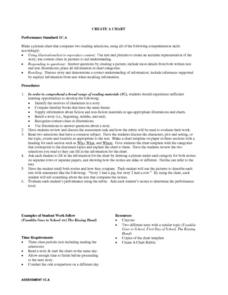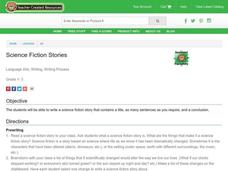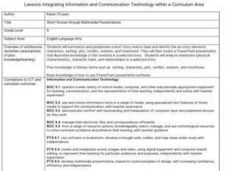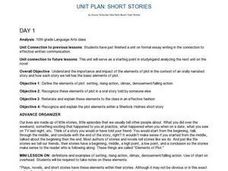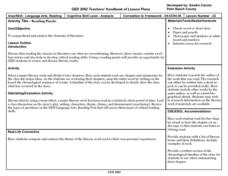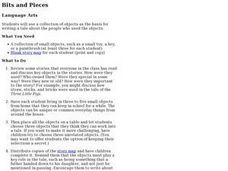Curated OER
Story Elements
In this story elements worksheet, students examine 20 things listed in a chart. They write the correct number inside each box to indicate what type of story element it is: the title, the author, the characters, or the setting
Curated OER
Picture Story Board
In this story elements worksheet, students sketch 4 pictures to fill a story board graphic organizer. They draw the beginning of their story, two pictures for the middle, and one more for the ending.
Curated OER
Setting Graphic Organizer
For this language arts worksheet, students consider the setting of a book by completing a graphic organizer. Students fill in details pertaining to where and when the story takes place as well as changes in the setting during the story....
Curated OER
Story Map 1
In this literature response worksheet, students create a story map to display the important elements in a book they have read. On this graphic organizer chart, students record setting, time, place, characters, problem, events (plot) and...
Curated OER
Story Map
In this reading worksheet, students recall important story elements by filling out a simple story map. Included are setting, author, characters, beginning, middle and end.
Learning Station
More Than Anything in the World
In this reading comprehension worksheet, students will read a short passage noting point of view. Students will then complete the story adding problem solving to the story ending.
Curated OER
Writing Parts of a Story
For this writing worksheet, students analyze the literary elements in a story. Students write short responses for the following categories: setting, characters, beginning, middle (problem), solution and end.
Curated OER
Map Making
Young scholars examine a variety of strategies to identify the structure of a story. They listen to the book Where the Wild Things Are and, as a class, complete a story element chart. Students independently read a passage from...
Curated OER
Story Elements
Students create a "character T-shirt" that exemplifies their ability to analyze a character. The students also compare and contrast characters in a given story. Finally, the students write a presentation about the story's characters,...
Curated OER
Beginning, Middle, and End
First graders identify the beginning, middle, and ending of a story and describe the plot, setting, and the characters. As a class they read a picture story and identify the beginning, middle, and end. Students then draw a picture of...
Curated OER
Teaching a Short Story
Students work in small groups and prepare an analysis of a short story to be presented to their peers. They research the story and create a handout or a visual aid that cites sources of information and summarizes the main points of the...
Curated OER
Create a Chart
Students create charts for story elements. They read two selections that share a common theme and discuss the story elements. They create a chart for the characters, plot, and setting and complete it while reading the selections.
Curated OER
Cooperative Learning Groups Cooperate
Pupils apply Bloom's Taxonomy to reading selections. They prepare questions for each level of Bloom's Taxonomy and exchange them with other groups to answer. They answer another group's questions and report to one another.
Curated OER
Building Two Literature Pyramids
Pupils create literature pyramids. They read selections of various societies, eras, and ideas. They complete two pyramid sheets for the same literary element including either plot, character, setting, or theme. They color-code their...
Curated OER
Building a Literature Pyramid
Pupils create a literature pyramid. They review and discuss their assessment task and rubric and select the literature for their pyramid. They read the literary selection and complete a pyramid sheet for one of the four literary...
Curated OER
Story Map Situations
Third graders explore a variety of ways to represent text. They represent text in story maps while on the playground. Students depict the elements of a story on a story map. They create a poster for character, setting, problem, and the...
Curated OER
Science Fiction Stories
Students review the story writing process and the elements such as prewriting, drafting, editing, revising, publishing, and assessment. Next students write a science fiction story that contains a title, the requested number of...
Curated OER
Short Stories Through Multimedia Presentations
Ninth graders summarize and paraphrase a short story read in class. They identify the six story elements of character, setting, plot, conflict, solution, and tone/mood. Students create a PowePoint presentation that illustrates the...
Curated OER
Information Problem Solving--Lesson 3 of 5
Students examine a selected story/book and practice identifying the setting, characterization, and plot. As a class, they identify problems in the story, turning points and the climax. They use a rubric to evaluate the story, as well.
Curated OER
Unit Plan: Short Stories
Tenth graders complete a unit of lessons on the story elements of Sherlock Holmes short stories. They analyze the plot elements, complete graphic organizers, read and discuss the plots, observe a person and take notes, and analyze an...
Curated OER
Reading Puzzle
Twelfth graders examine the elements of literature. They each read a chapter of a novel, sequentially list the main ideas, present a summary of the chapter to the class, sequence the events, and review the novel by summarizing the timeline.
Curated OER
The Mysteries of Harris Burdick
Fourth graders read and discuss the book, The Mysteries of Harris Burdick. They create an original story that follows the Harris Burdick formula, and illustrate the story in the style of Chris VanAllsberg.
Curated OER
Bits and Pieces!
Students discuss story elements including characters, setting, problem and solution. They listen to the story, Winter Fun, and identify the story elements. Then they draw pictures and write one sentence for each story element.
Curated OER
Let's Watch a Story
Fourth graders watch a silent movie and identify the elements of a story. They complete a worksheet attached to the lesson and discuss their answers.













